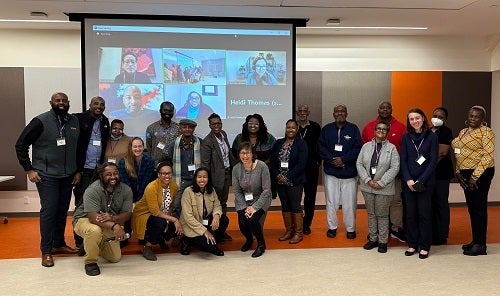How can we make treatment more appealing and effective for Black people who have substance use disorders?
That's the question that the Grayken Center for Addiction set out to answer in its comprehensive research study, which is now published in Social Science & Medicine and available open-access. The research team included Miriam Komaromy, MD; Phillip Reason, MSW, MPH; Daneiris Heredia-Perez, MSPM; Kaku So-Armah, PhD; NaTrina L. Johnson, PhD, MPH; Corinne Beaugard, PhD, MSW; Christina S. Lee, PhD; Sheila E. Chapman, MD; Craig McClay; Avik Chatterjee, MD, MPH.
The Background
The Substance Use and Anti-racism (SUDA) Research Program launched at the end of spring 2021. It is a community-engaged process to improve addiction treatment for Black patients. The guiding question is, “How can we make addiction treatment more appealing, effective, and equitable for Black patients?”
In the earliest phase of the project, researchers integrated a range of methods, including focus groups with Black patients who have substance-related problems and live in the neighborhoods surrounding BMC, and six scoping literature reviews to understand key factors that shape Black people’s experiences of addiction treatment. This later led to the next phase funded by the Patient Centered Outcomes Research Institute.
Embracing Anti-racism in Addiction Treatment, Research, and Policy Convening

Nine people were recruited from the focus groups to join the group as research partners; and are referred to as the Council of Experts on Patient Experience (CEPE). To date, they have served as collaborators at pivotal junctures of this research program. Following the research in the earliest phase, data was analyzed and divided into four separate domains; provider factors, system factors, patient factors, and trauma factors. To understand and interpret what was in the data more than 50 multidisciplinary addiction experts, including people with lived experience from across the state, and a few from across the US were brought together. With funding from the Patient Centered Outcomes Research Institute, four day-long convenings with 20 participants each day were held at Roxbury Community College. Throughout the convening, attendees examined the focus group quotes and information from studies that were gathered.
The goal of these meetings was to translate what was learned into action items that could be implemented to improve addiction treatment for Black people. The groups produced action items related to the addiction treatment system, and another set related to the larger systems that intersect with addiction, such as policing, incarceration, and agencies charged with protecting families, as well as key unanswered questions. After presenting in the community and at several conferences, the project team published an article describing the project.
Funded by Patient Centered Outcomes Research Institute (PCORI) EASCS-24155
Residential Addiction Treatment Programs Can be Hostile Environments for Black Patients and Policy Changes are Urgently Needed
A key finding from the first phase of the SUDA Research Program was that residential addiction settings were often perceived as hostile environments by Black patients, in part due to their punitive and rigid policies, which mimic carceral settings. The goal of the next phase of our work was to understand policies that impact Black patients and develop model anti-racist operational policies specifically tailored for residential addiction treatment programs. With funding from Boston University, the project team conducted key-informant interviews with Black individuals who had experience leading or being patients in programs that were designed to provide culturally tailored treatment to Black patients. In addition, the project team partnered with Brockton Behavioral Health Center Clinical Stabilization Services (CSS) which serves a racially diverse patient population and conducted a series of five focus groups with the leadership team, the staff, and the Black patients. The team conducted a modified thematic analysis to develop a draft of recommendations and then returned to this treatment setting to present the conclusions for feedback. Next steps will include piloting interventions, preparing to measure the impact of implementing these recommendations, and developing training materials and implementation toolkits.
Funded by the Boston University's Center for Anti-racist Research
Lived Experience Advisory Panel Addiction Research Consultation Service (LEAP)
Starting in fall of 2025, the Grayken Center for Addiction will offer BMC/BU addiction researchers consultation on how to make their research more relevant for Black people and more inclusive of Black research participants.
Contact
For more information on the Grayken Center's Antiracism work, please email Daneiris.Heredia-Perez@bmc.org.
To see more research projects from the Grayken Center for Addiction, visit the Research page.

 en
en 

 Français
Français Deutsch
Deutsch Italiano
Italiano Español
Español Tiếng Việt
Tiếng Việt Kreyol ayisyen
Kreyol ayisyen